
Who among us has never asked for help? Who among us is so self-sufficient that they have never relied on the kindness of strangers? And when we ask for help, or lean on our friends, family or even strangers for support, have we given up our dignity, or are we simply demonstrating our humanity? What, after all, is more human than relying on our greatest strength, each other?
“There is nothing dignified about standing on street corners, or venturing into the middle of the street, dressed in dirty, shabby clothes, in all sorts of weather, with a crude cardboard sign, begging passersby for help,” wrote Bishop Thomas Tobin in a letter to the Providence Journal last week, but he was wrong. Dignity, the state or quality of being worthy of honor or respect, is, by Catholic principle, “inherent and inviolable.” Human dignity has been called the “cornerstone of all Catholic social teaching.”
Humanists affirm the dignity of every human being. A cornerstone Humanist document is the United Nations Universal Declaration of Human Rights. Article 1 states, “All human beings are born free and equal in dignity and rights. They are endowed with reason and conscience and should act towards one another in a spirit of brotherhood.” No distinction is made in the declaration based on class or property.
I’ll avoid the sexist term “brotherhood” (the Declaration was written in 1948 after all) and call it our “spirit of kinship.” This idea, that we are one large human family, reminds us to rely on each other when things go wrong in our lives. Our kinship is a fundamental part of what makes us human, and without it, our society and our lives fracture.
Through this fracturing, people end up on the street, homeless, hungry and alone with their demons. The truth of human dignity means that it should not be the responsibility of the downtrodden to ask for our help. Our own human dignity requires us to offer it.
The Universal Declaration of Human Rights also affirms the human right to expression, the human right to freely move within our cities and as a consequence, affirms our right to ask for assistance.
“The problems [associated with panhandling] have spread since Mayor Jorge Elorza, responding to the threat of action from the American Civil Liberties Union and others, directed that the police should no longer enforce ordinances dealing with panhandling and loitering,” said Tobin in his letter. “The ACLU, while presumably well-intentioned, has done no one a favor.”
In defending the human and constitutional rights of panhandlers, the ACLU respected human dignity in a way Bishop Tobin seems unprepared to do. The “favor” the ACLU did was to remind us that rather than sweeping people in need out of sight, it is far better to provide the things they need to live their lives comfortably.
Some religious leaders understand this, but many others don’t get it, even as they wonder why their moral authority is crumbling.
]]> On Wednesday morning, reporters and activists were prevented from attending real estate developer Joseph Paolino’s press conference where he was to announce his plans regarding the issue of homelessness. The behavior of the security guards and police officers at the Providence Convention Center, where the press conference was held, became a preview of what many fear might become the norm if the wrong policies are instituted in downtown Providence.
On Wednesday morning, reporters and activists were prevented from attending real estate developer Joseph Paolino’s press conference where he was to announce his plans regarding the issue of homelessness. The behavior of the security guards and police officers at the Providence Convention Center, where the press conference was held, became a preview of what many fear might become the norm if the wrong policies are instituted in downtown Providence.
As activists and reporters entered the convention center, a security guard raised his hand and stopped everyone cold. “I don’t know where you guys are trying to go,” said the guard, “but I can’t let you guys go anywhere.”
A Providence police officer added that only “designated” people were allow to go up to the fifth floor where the press conference was taking place. It became quickly apparent that the activists and some reporters were not the “right kind of people” for the exclusive press conference.
Calls upstairs to the people in charge were useless. It didn’t matter to the convention center security guards or to the police officers that reporters and city residents were being denied access to a public meeting pertinent to their lives. What mattered, it seemed, was how one was dressed, who you knew, and how security perceived you.
People who were dressed in nice suits and ties, wearing nice clothes and carrying briefcases – or, let’s face it, white and upper class people – were allowed access. If you didn’t fit that bill, you were stopped in the lobby.
WPRO reporter Anita Baffoni was allowed upstairs with another woman who claimed she was a reporter, but RI Future’s Bob Plain was denied. Security claimed that the women had “credentials.” This is a matter in dispute.
Soon, people came downstairs from where the press conference was taking place and started approving some people and turning down others. Again, this was done either from familiarity, i.e. people in positions of authority recognizing each other, or through profiling along racial and class lines.
“It’s a private meeting,” said a man, who suddenly seemed in charge. “We’re trying to treat everyone like ladies and gentlemen,” he said. I countered that he was treating people like “second-class citizens” but he doubled down, saying that that “was absolutely not true.”
Some people were allowed to take the escalator without having so much as a single word or objection from security lobbied at them. These people were white and dressed nicely. For others it became necessary to storm past security and risk arrest if they wished to attend the press conference.
Convention center security eventually admitted that they couldn’t accost people. That didn’t stop them from threatening arrest. The Providence Police who were present were not arresting people, however, even when some activists made it all the way up to the fifth floor and began chanting outside the room where Paolino was holding court.
Is this the future for Kennedy Plaza? Access for some, as long as they look rich and white and have the right connections, while others become subject to ruthless regulations meant to keep us always on the edge of arrest?
Ordinances, such as “banning the distribution of anything to occupants of vehicles” are being proposed to the Providence City Council and being seriously considered. The ACLU’s Steve Brown calls this proposed ordinance “a direct attack on individuals who are struggling with homelessness or poverty and who seek to peacefully exercise their First Amendment rights to solicit donations.”
To his credit, Paolino said that restricting access to some reporters was inadvertent. He said he had no intention of preventing RI Future, the Providence Journal, RINPR and the Providence Business News from attending. But he did want to keep the activists and protesters away. He didn’t want his press conference disrupted.
When we hide our public meetings and press conferences behind security guards and police officers, restricting access to only the “right” people and the proper, embedded media, we set up a system that respects the rights of the rich over the rights of the poor. We set up a two tiered class system of the kind that lifts up some people by stepping on others.
Not unlike what some people would like to see in Kennedy Plaza.
]]> Because Invenergy “has either refused or is unable to provide timely information regarding its proposed water supply… its Application should… be dismissed” writes Attorney Michael McElroy, representing the Town of Burrillville, in a motion filed with the Energy Facilities Siting Board (EFSB) today.
Because Invenergy “has either refused or is unable to provide timely information regarding its proposed water supply… its Application should… be dismissed” writes Attorney Michael McElroy, representing the Town of Burrillville, in a motion filed with the Energy Facilities Siting Board (EFSB) today.
Invenergy is proposing to build a $700 million fracked gas and diesel oil burning power plant in Burrillville, a project that has the support of both Governor Gina Raimondo and the Providence Journal. The residents of Burrillville and every environmental group in Rhode Island oppose the plan.
Invenergy’s original plan was to pump water from a well contaminated with MTBE, but on Aug 19 the Pascoag Utility District voted unanimously to deny Invenergy access to that water. Under EFSB rules and the Act that established the EFSB, “Applications must include information regarding all required support facilities, including water resources.” Without such information, writes McElroy, “The Application cannot be evaluated in a meaningful way.”
McElroy’s motion to dismiss also notes that the Town of Burrillville, the Burrillville Planning Board and the Burrillville Zoning Board of Review “have formally requested information regarding Invenergy’s water source on multiple occasions” and that “Invenergy repeatedly promised to provide such information, but to date has failed to do so.”
“In fact,” writes McElroy, “in a Motion for Extension filed by Invenergy last Friday, Invenergy stated that its ‘expects’ to have a water source ‘within the coming weeks.’ This is uselessly vague.
Jerry Elmer, Senior Attorney for the Conservation Law Foundation (CLF), “supports the Town of Burrillville’s Motion to Dismiss the Invenergy case, which was filed today. In fact, CLF has been preparing its own Motion to Dismiss on the same grounds as the Town’s Motion: The Energy Facility Siting Board (EFSB) process cannot go forward without the required Advisory Opinions from the Town; and the Town cannot prepare the required Advisory Opinions because Invenergy has failed to provide legally required information.
“Invenergy’s application to build a new fossil fuel power plant in Burrillville is incomplete, and the EFSB must dismiss the application. CLF argued its first Motion to Dismiss last January because Invenergy’s application was incomplete then; and CLF will continue to argue the same point now: Invenergy’s application remains incomplete. It is past time for the EFSB to dismiss this case.”
]]>
On the day the Rhode Island Senate Finance committee passed the legislation that would establish the Energy Facilities Siting Board (EFSB), Robert L Bendick Jr, the director of the RI Department of Environmental Management (DEM) asked, “I just wonder what’s going on here. What’s the driving force behind this?” [Providence Journal, April 11, 1986; pg A-15]
The question Bendick asked on April 9, 1986 strongly resonates today. Jerry Elmer, of the Conservation Law Foundation, said the EFSB “was designed to take the power to stop a proposal like Invenergy’s out of the hands of the local people… and put it into the hands of the EFSB.”
Governor Gina Raimondo refers to EFSB decision making as “the process” and asks us all to trust in it, but how are we to trust if we can’t tell if the intent of the process is to serve Rhode Islanders or to serve the energy industry?
What is going on here? Here’s some historical context.
Back in 1986, Ward Pimley, writing for the ProJo, wrote, “Sen. Victoria Lederberg, D-Providence, the sponsor, said the [EFSB] bill streamlines the approval process required for obtaining licenses to build major energy facilities for generation of electricity, treatment of liquefied natural gas, oil refineries and the like…”

Victoria Lederberg was an impressive woman and public servant. A judge, she “served as state representative from 1975-1983 ,representing the East Side of Providence, and state senator from 1985-1991… Lederberg was a trailblazer, becoming the first woman of Italian heritage to serve in the Rhode Island legislature.”
Pimley continues, “In previous testimony, Lederberg called the siting board concept ‘one-stop shopping,’ where interested developers could learn what they must do to obtain licenses and fulfill obligations to build. She said it removes jurisdictional overlapping among regulatory agencies.
“She said the bill recognizes the state’s need for ‘reasonably priced, reliable sources of energy’ and balances that with issues affecting public health and environmental impact.”
Nine years earlier, in his January 1977 inaugural address, Governor J Joseph Garahy outlined his ideas for the state’s energy objectives. Siting of energy projects heretofore had been haphazard, and based solely on the whims of industry. Garahy had a vision “to site energy facilities in light of state plans, rather than private industry decisions.” He was governor of a Rhode Island that was suffering from environmental mismanagement, and the new governor was hoping for a different approach. The EFSB, at its best, would be a realization of Garahy’s vision, but in an effort to please industry rather than regulate it, Garahy’s vision may have been compromised.
Public Utilities Commission] Chairman Edward F Burke, Pimley wrote, “testified earlier that the legislation is important because there are eight or nine potential applications for energy-generating facilities that could be built in some other state unless the licensing procedure were streamlined.
“He cited a $300-million facility proposed for Burrillville that should provide electricity by 1989 on property owned by Narragansett Electric as an example of the type of facility that can be built.”
This $300-million facility is the Ocean State Power plant, which currently uses 4 million gallons of water a day to cool its turbines.
Recognizing that the EFSB would allow industry to override the environmental concerns of the state, Sen. William C. O’Neill, today more famous as a South County bike path than a Democratic senator from Narragansett, objected. Here’s Pimley’s play-by-play of what he called a ‘hot debate’:
“You feel DEM is an obstacle,” O’Neill said. “You removed that obstacle, and you know it.”
“You’re absolutely incorrect,” Lederberg shot back.
“I’m concerned that you’re allowing other agencies to override DEM,” O’Neill said.
“I totally disagree,” Lederberg said. “This shares decision-making. DEM has an important role. That’s why we’ve made them one of the board members. It does not weaken the permit-granting power by DEM.”
Lederberg said DEM does not have veto authority to stop any project it wants, but it still is involved in the planning process.
Then Sen. David R. Carlin Jr, D-Newport, said the siting board can overrule decisions of other agencies.
“It seems it’s clearly overriding DEM,” he said.
O’Neill, seeing DEM Director Robert L Bendick Jr watching the proceedings, said he would vote for the bill if Bendick agreed that DEM’s interests would not be jeopardized by it, but committee chairman Donald R. Hickey, D-Providence, called for a vote.
“The bill was approved, 8 to 4.”
This is what prompted Bendick to ask, “What’s going on here?” adding, “If what they’re doing is overriding the department’s authority, I’m opposed to it.”
Months earlier, in an editorial, the ProJo had endorsed Lederberg’s proposal writing, “As a House member in 1979, Mrs. Lederberg sponsored a similar bill that died in the Senate. Former Gov. J. Joseph Garrahy, who supported the bill, issued an executive order embodying many of its details, but that wasn’t an adequate substitute for statutory enactment…
“Mrs. Lederberg says energy installations must be reviewed in terms of regional need and cost-effectiveness, not on the basis that Rhode Island must be totally self-sufficient in energy.” [Providence Journal February 17, 1986; page A-10] Note that Lederberg is not quoted as mentioning, and that the ProJo editorial seems uninterested in, environmental issues.
Pimley noted that the bill, as originally introduced by Lederberg, allowed the General Assembly to override an EFSB decision, but that provision was removed before passage because “it was no longer needed.”
Pimley also noted that “support for the legislation came from the Governor’s Office of Energy Assistance, the PUC and Narragansett Electric Co.”
Narragansett Electric is today a wholly owned sub-entity of National Grid.
Of special concern to all involved with the establishment of the EFSB was a proposal “to build twin natural-gas-fired plants in Burrillville. According to a plan disclosed Tuesday, the plants would be supplied by a new, 25-mile gas pipeline that would run from Sutton, Mass., to the Burrillville site and on to Cranston.” [Providence Journal, February 13, 1986; page A-14]
The very first application the EFSB took up was the Ocean State Power Plant in Burrillville.
]]>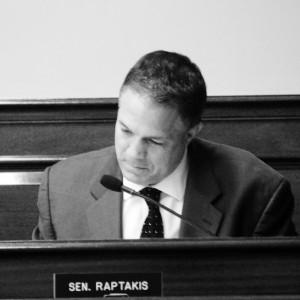
Perhaps the most honest statement to come out of the Senate Judiciary Committee regarding Paul Fogarty’s bill S3037A came in the hallway outside the hearing room after the vote, courtesy of Senator Leo Raptakis.
“What happened in there?” I asked.
“I don’t know,” replied Raptakis, “I don’t know why they brought it up for a vote at all.”
The confusion Raptakis felt was understandable. Normally, if you want to kill a bill in the General Assembly, you just never let it come to a vote. Eventually the session ends and the bill is dead.
So why bring the bill up for a vote? What was really going on?
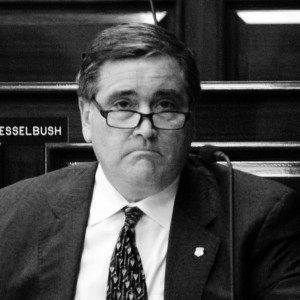
Senator Paul Fogarty’s bill would have allowed the voters of Burrillville the opportunity to vote on any tax agreements made by their town council with any power plant located in the town. The immediate effect of the bill would be to allow voters to decide on a tax treaty being negotiated with Invenergy, which wants to build a $700 million fracked gas and diesel oil burning power plant in the town. The Burrillville Town Council has been repeatedly dishonest with the residents of the town, and has been actively working to bring the power plant into the town against the wishes of most residents. Residents of Burrillville want a say in the process and they want to prevent the power plant from being built.
The House version of the bill, sponsored by Representative Cale Keable, passed out of the House Committee on Environment and Natural Resources on an 11-2 vote and passed the full House on June 8. The Senate version, after a long, contentious hearing that pitted Burrillville residents and environmentalists against labor and business, was tabled without a vote.
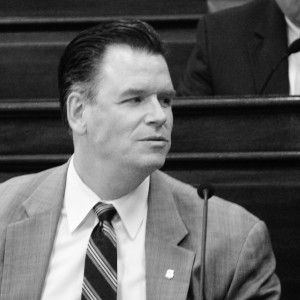
The forces in favor of the power plant did not want this bill to pass. It is believed by many that this bill will make it impossible for the power plant to be built, because it will interfere with Invenergy’s ability to secure financing for the project. A stable tax treaty is important to Invenergy because without it, the company faces the prospect of paying full taxes on the power plant. No tax treaty, no funding, some say.
In an effort to kill the bill, Invenergy paid for a full page ad in the Providence Journal. An editorial and an op-ed were published in the paper as well. Pressure was brought to bear on the Senate from the Greater Providence Chamber of Commerce and the Northern Rhode Island Chamber of Commerce whose lobbyists testified against the bills. And labor, which wants the plant built because of the much needed jobs it will provide, lobbied the Senate hard.
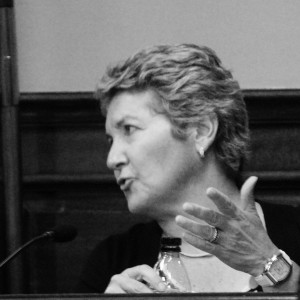
Meanwhile, there was pressure being placed on Governor Gina Raimondo by environmentalists to not veto the bill, were it to be passed. Raimondo did not want to be put in the position of having to veto this bill. She wants the public appearance of being strong on environmental issues, even if she supports fracking and fossil fuels. For Raimondo’s purposes, the less known on the national scene about her true environmental positions, the better. Vetoing this bill would create the wrong kind of headlines, the kind of headlines that might hamper her national political ambitions.
Satisfying these powerful players is easy. All that needed to happen was for the bill to never get out of the Senate Judiciary Committee, and the bill would die, never to be voted on. There’s only one problem: If that were to happen, Senator Paul Fogarty would have failed the community he serves, and though Fogarty, for political reasons, is opposed to the power plant and in favor of his bill, he’s a strong union member and supporter. Under normal circumstances he would be a reliable pro-union vote and a valuable ally.
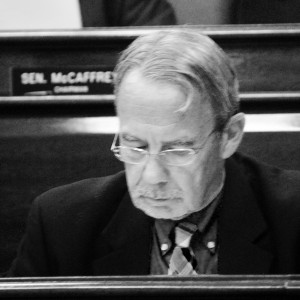
A way to both kill the bill and save Paul Fogarty’s political career was therefore devised.
Four Senators, Frank Lombardi, William Conley, Donna Nesselbush and Stephen Archambault, presented legal-sounding arguments against the bill, all the while telling Burrillville residents watching the proceedings live or at home how wonderful their Senator Paul Fogarty is. They laid it on pretty thick at times.
“Kudos to Senator Fogarty for the concerns that he showed his constituency in the town of Burrillville,” said Senator Lombardi, “and [for] having the intestinal fortitude to bring forth the bill on the behalf of his constituents.
“And I mean this, Senator,” continued Lombardi, looking at Fogarty who was seated in the center of the room, “I think that the people of the town of Burrillville are very fortunate to have you as their Senator and the work that you do for them. Quite frankly you listened to them and you put forth what you thought was a very favorable bill for your citizenry.”
Not to be out done, Senator Conley said, “Senator Fogarty’s advocacy on behalf of the people of Burrillville on this issue was extraordinary. I’m just about at the close of my fourth year in the General Assembly and I can say without reservation that I’ve never seen one of my colleagues advocate in such a meaningful and, I don’t want to say aggressive but certainly in a strong way, on behalf of legislation. His heart and soul is behind this bill and whether you agree with one of your colleagues or not, it’s always that kind of advocacy in this building that often goes unsung. So it’s important to note that.”
Senator Nesselbush was more circumspect in her praise, saying, “Senator Fogarty has been a passionate supporter of this bill that he even convinced me to be a co-sponsor of the bill.”
Senator Archambault, who might run for Attorney General in 2018, also chimed in with praise for Fogarty, “I want to echo the sentiments of my brothers and sister with respect to Senator Fogarty. He’s been here for you all along, he’s put in a tough piece of legislation, it certainly hasn’t made him any friends on one side but he did it because he cares. I think his actions speak for themselves.” After this performance, I don’t think any environmentalists will be voting for him.
With Senator Fogarty properly lionized and hopefully protected, all the Senators needed was an excuse, any excuse, to vote against the bill. As it is, they produced three excuses. They also needed someone to blame. They couldn’t blame the business community, they couldn’t blame the Governor and they couldn’t blame labor.
Enter the Republican Burrillville Town Council with their press release turned resolution. At the original Senate Judiciary Committee meeting to discuss the bill, Senator Lombardi foolishly tried to pass off a press release against the bill from the town council as a resolution, but in fact the Burrillville Town Council didn’t get around to issuing an actual resolution until the committee meeting was almost over. But now, with a “proper” resolution in hand, Lombardi was able to produce a villain: the Burrillville Town Council.
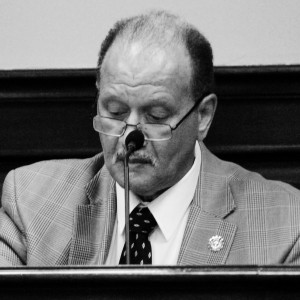
In his statement after the vote, Fogarty expressed his disappointment at the bills defeat, but did not blame the vote on his fellow senators. Instead, he referred to the resolution, writing that the “last-minute opposition of the Town Council… [was] the equivalent of getting two torpedoes to the bow.”
“It’s a shame that the Burrillville Town Council does not have enough faith and confidence in the local citizenry to make an informed decision on a matter that will impact the future of their community,” wrote Fogarty, forgetting that it was the Senate Judiciary Committee, not the Burrillville Town Council that killed the bill.
Lombardi’s second excuse was that he was concerned about the precedent that passing the bill would set. He said that when the residents of a city or town disagree with their elected officials, they shouldn’t be looking to the state to pass new laws. Lombardi feared that the General Assembly might be flooded with every local issue that is “controversial” if they passed this bill. Of course, it’s fairly easy to find dozens of examples where the state has stepped in to override local laws and ordinances. The very creation of the Energy Facilities Siting Board, the body that will ultimately decide whether or not the power plant will be built, is an example of the state overriding local concerns and laws, for instance.
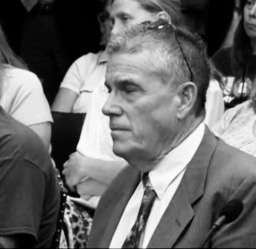
Lastly, Lombardi noted that one of his colleagues “was gracious enough to provide us with a Rhode Island Supreme Court case entitled Warwick Mall Trust v State of Rhode Island.” Sources told me that the court case was provided to Lombardi and the other senators by Senate Majority Leader Dominick Ruggerio, a strong supporter of labor who sat in on the original Senate Judiciary Committee meeting that heard testimony on this bill.
Lombardi said that the decision in this case could be applied to Fogarty’s bill, and claimed that the bill, as written, would be unconstitutional.
In the end, of course, the Senate Judiciary Committee voted Fogarty’s bill down. It was such an unusual occurrence that Chairman Michael McCaffrey couldn’t quite get his head around how it was supposed to work. As the chairman struggled to find the right way to phrase a no vote, two Capitol Police Officers entered the room, to make sure the crowd did not react aggressively to the decision everyone seemed to know was coming. The vote was 7 -2 against. Only Nesselbush and Erin Lynch Prada voted in favor of the bill.

The disappointment of the Burrillville residents could be felt physically. There were tears. Nick Katkevich, of the FANG Collective, shouted “Shame!” as he was leaving the room. The Capitol Police responded by telling Katkevich to leave, but he was already gone. Out in the hallway, there were more hugs and tears among the Burrillville residents.
They say they will continue the fight.
Looking over every single Senate Judiciary Committee vote this session, you will find that every bill brought up for a vote passed. In fact, every bill before this committee, but two, passed with no votes against them. The two exceptions were S2333 on May 5 and S2505 on March 3, and both times it was Senator Harold Metts casting the lone vote against. Until this day, six of the senators present had not cast a no vote in committee this year.
The truth is that no one is ever really supposed to vote no. These committee votes are pro forma. It’s theater. Every vote serves a purpose and no bill is voted on in committee without a predetermined outcome known well in advance.
And the vote on Paul Fogarty’s bill was no different.
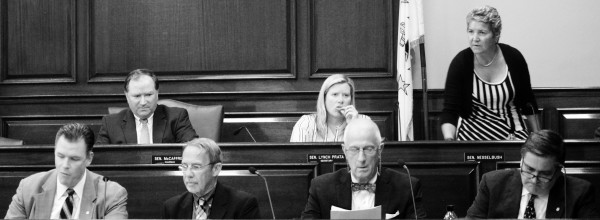
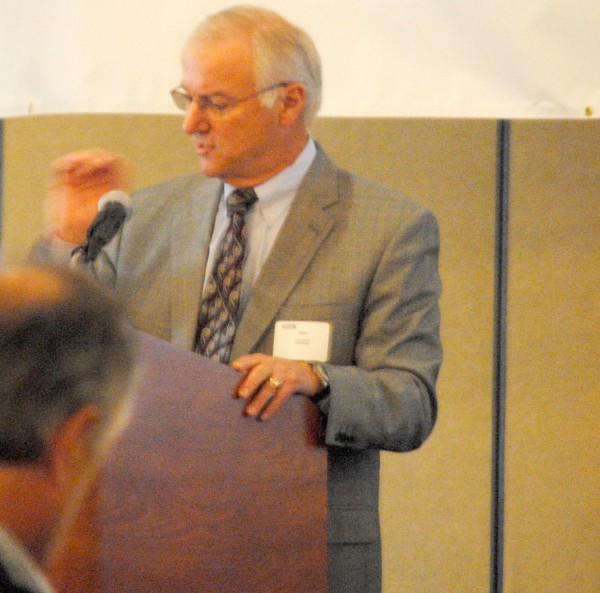
John Niland, director of development for Invenergy, knowingly mislead both the public and the EFSB, the board tasked with deciding the fate of the Burrillville power plant proposal, at a public hearing on the matter, according to the Conservation Law Foundation (CLF).
The Conservation Law Foundation (CLF) today filed two expert witness testimonies with the Public Utilities Commission (PUC) that reveals Invenergy representatives knowingly presented false facts and figures at a public Energy Facilities Siting Board (EFSB) hearing in Burrillville attended by 700 people.
The CLF testimony also provides further evidence that the electricity produced by a proposed $700 million fracked gas and diesel burning power plant in Burrillville is not needed in New England.
Invenergy’s estimates of consumer savings from the proposed plant are grossly inflated and inaccurate, says the CLF. Invenergy claims the power plant will save between $118 to $120 million for ratepayers. The actual number, according to CLF’s witnesses, is between 0 and $36 million.
Christopher Stix, first witness
The first testimony is from Christopher Stix, a volunteer financial analyst for the CLF providing financial and market analysis for CLF’s energy initiatives, specifically in the area of power plant licensing and electric and gas transmission. The testimony is lengthy and technical (and can be downloaded at the link above) but the actual conclusions of the testimony are fairly easy to present.
False Facts
Stix claims in his testimony that Invenergy knowingly presented false information at the March 31, 2016 EFSB hearing at the Burrillville High School.
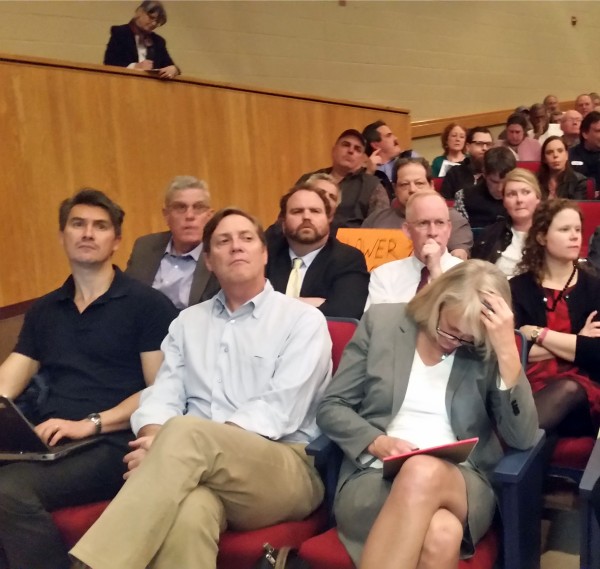 “…on March 31, in front of 700 people, Invenergy presented in two different ways… information that Invenergy knew, at the time, was false. First, the words “$280 million in Savings” appear in big, green letters on Slide 12 of Invenergy’s presentation… Second, the false information was emphasized by Invenergy’s John Niland, who said, “Talking about ratepayer savings, the analysis we’ve done looks at what happens to the cost of power to the region when you put in a plant like this. – – [T]hat’s really what the $280 million number represents.” [EFSB March 31, 2016 Hearing Transcript. page 16, lines 8-11; 15-17.)
“…on March 31, in front of 700 people, Invenergy presented in two different ways… information that Invenergy knew, at the time, was false. First, the words “$280 million in Savings” appear in big, green letters on Slide 12 of Invenergy’s presentation… Second, the false information was emphasized by Invenergy’s John Niland, who said, “Talking about ratepayer savings, the analysis we’ve done looks at what happens to the cost of power to the region when you put in a plant like this. – – [T]hat’s really what the $280 million number represents.” [EFSB March 31, 2016 Hearing Transcript. page 16, lines 8-11; 15-17.)
“…eventually Invenergy backed off its wrong assertion of $180 – $120 million in capacity savings in just FCA-10. In Ryan Hardy’s April 22 testimony, page 13, lines 20-21, Invenergy touts ‘Capacity cost savings to Rhode Island ratepayers . . . to be $170 million from 2019 to 2022, or $42 million annually on average.’ It is important to note here that in his testimony, Mr. Hardy gives no specific figure at all for projected capacity savings from just FCA-10. Instead, he sticks with a vague average over a period of several years.
“Mr. Hardy does not acknowledge in his April 22 testimony that his figure had changed radically from his sworn testimony before the EFSB on January 12, 2016, when he stated under oath that ‘the savings from capacity costs alone is nearly 212 million…’” [January 12, 2016 Transcript. page 164, lines 6-14; and Slide 24.]
“Third, and importantly, nothing changed between March 31, when Invenergy publicly presented figures that were grossly wrong, and April 22, when Invenergy presented very different figures. The relevant FCA had occurred on February 8. Invenergy acquired no new information between March 31 and April 22. Thus, there was absolutely no reason for Invenergy to have presented inaccurate information to the EFSB and Burrillville residents on March 31.”
Power plant not needed
Early on, Stix was asked if the New England electricity grid needs the proposed Invenergy plant.
Stix replied, “neither the New England electricity grid, nor the ISO, needs Invenergy in order to keep the grid reliable. Overall, in FCA-lO, the ISO procured fully 1,416 MW more than its ICR. Even if you subtract all 485 MW of the CSO acquired by Invenergy, the ISO would have still over-procured 931MW. And, here in the SENE zone, the ISO procured 1,321 MW more than its LSR Again, even if you subtract all 485 MW of the CSO acquired by Invenergy, the ISO would still have over-procured 836 MW in the zone The result of FCA-10 shows that the generation capacity that the Invenergy plant would bring to the electricity grid is not needed in Rhode Island, and is not needed in New England.”
Inaccurate consumer savings
Stix testified that “[t]he irrefutable, bottom-line fact is that Mr. Hardy and [PA Consulting Group] wrongly predicted savings to Rhode Island ratepayers,just from capacity, and just from FCA-l0, to be between $118 and $120 million dollars. The actual figure was somewhere between zero and $36 million. Mr. Hardy’s projected figure was 272% of the actual figure, and maybe much, much more than that. To put it another way, it is just not true to say that a predicted result of $118 million in ratepayer savings in one year “is very close to” ratepayer savings of between zero and $36 million. I doubt very much if Rhode Island ratepayers consider $118 million in one-year savings to be “very close” to zero to $36 million. And I doubt that the PUC will view it that way, either.”

Robert Fagan, second witness
The second witness testimony presented by the CLF today is from Robert Fagan, a Principal Associate at Synapse Energy Economics, a research and consulting firm specializing in electricity industry regulation, planning and analysis.
Fagan also says the proposed power plant is not needed in both the short, medium and long terms. He says there is no “near-to-medium term reliability need for the proposed Invenergy plant,” pointing out that “existing and projected energy efficiency and behind-the-meter solar PV resources in New England more than supplant the energy output of the proposed plant and support a reliable electric sector in Rhode Island and New England without the proposed plant” and “there is no longer-term reliability need for the proposed plant.”
Fagan says that “Rhode Island and New England net loads… exhibit declining trends, contrary to the applicant’s assertions.” Invenergy claims that the ISO-New England Forward Capacity Markets indicate need, but as we have seen, they do not.
Further, Invenergy offers, “no evidence of any longer-term reliability or other need for the proposed plant. They incorrectly inflate the energy forecast need for Rhode Island and New England. Their narrative on alternative energy resources, including energy efficiency and renewable energy resources, is completely absent of any quantitative analysis of the effect of a portfolio of energy efficiency and renewable resource supply as an alternative to the proposed plant.
Looking to the longer term future of energy in Rhode Island, Fagan says, “When considering energy efficiency and alternative new resources including behind-the-meter solar PV, other solar PV (utility scale), onshore wind, offshore wind, Canadian hydro, demand response, and storage alternatives – in addition to existing capacity resources and a recently strengthened New England transmission system – near-term and long-term reliability of Rhode Island and New England electric power sectors can be assured without reliance on the proposed power plant.”
Fagan also says that, “The applicant’s failure to present any evidence of a long-term reliability need for the plant is significant, because absent such a need, I don’t see how this proposed plant fits with Rhode Island state energy policy that, according to the applicant, emphasizes increasing energy efficiency, integration of renewable energy into the system, and achieving reductions in greenhouse gases.”
]]>
The Burrillville Town Council opposes legislation moving through the State House that would give local residents greater say on the tax agreement between the town and the proposed fracked gas power plant.
“The ill-conceived legislation before the General Assembly that purports to give residents a voice in the matter – in fact does the opposite,” said a letter released to RIPR’s Ian Donnis last night. “It weakens the Town Council’s ability to protect its residents and obtain financial compensation for hosting the proposed power plant.
The documents were released to Donnis by Dyana Koelsch, retained by the Town Council to handle public relations on their behalf. Koelsch, a former journalist-turned-public relations consultant, told me in a phone conversation last week she was retained by the Town Council to facilitate better communication between the Town Council and local residents.
The release of these documents seems to have come some time after the House passed Representative Cale Keable‘s bill, H8420 Sub A, which, if it becomes law, will allow the voters of Burrillville the opportunity to approve or reject any proposed tax treaty the Town Council makes with an power plant by popular vote. In recent days opposition to this bill has been ramping up, with Invenergy purchasing a full page ad in the Providence Journal on Saturday, an op-ed co-signed by Laurie White of the Greater Providence Chamber of Commerce and Michael Sabitoni of the Rhode Island Building and Construction Trades Council on Sunday, and a bellicose tirade on the Journal’s editorial page yesterday.
Despite the opposition of business leaders and unions the Keable bill passed the floor 64 to 7 as Burrillville residents applauded. You can watch the vote below and see the reaction of Burrillville residents below. The difference between the votes reported above and the votes pictured is due to some legislators entering their votes late.
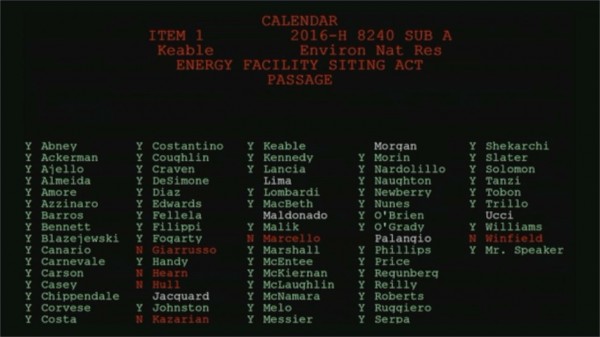
The release of the Burrillville Town Council letter opposing the Keable bill provoked a flurry of responses on social media. At about 10:30pm Burrillville City Councillor David Place confirmed that the letter was indeed accurate when he commented on Burrillville resident and power plant opponent Jeremy Bailey’s Facebook page.
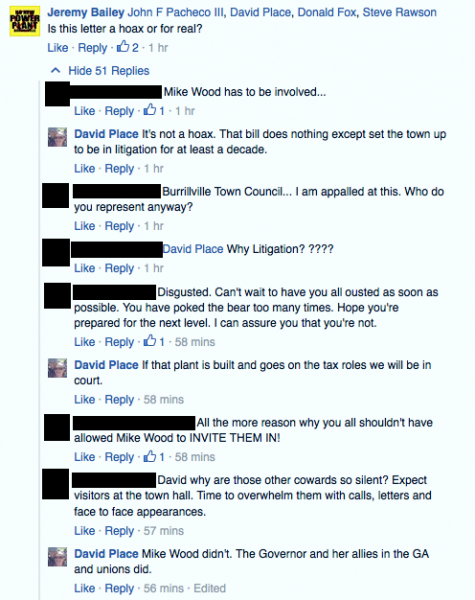
The reaction from Burrillville residents has been negative and angry:
- “I have NEVER seen such political BS in my life!!!“
- “Has to be a back room deal going on ! Obviously representing Invenergy’s interest over the citizens!!!!“
- “This is very disappointing and kicks us in the gut ! These council people are traitors and sneaky too, it’s not fair to the towns people!“
It’s unclear when the Town Council decided to write the letter, or if that decision was made at a public meeting.
The timing of the release is strange, since tomorrow evening there is a Town Council meeting scheduled, with public comment. Past Burrillville Town Council meetings have been contentious. Tomorrow night’s promises to be explosive. Why the Town Council would choose to invite the approbation of their constituents is a mystery. There is talk of a recall election for the four Town Councillors not up for re-election this fall.
The most startling thing about the documents released is that they contain details of the town’s negotiated tax deal with Invenergy, details that the Town Council has previously stated must remain secret while being negotiated. Though the tax deal is not yet done, the Town Council says there is “an agreement in principle on the following:”
- $2.9 million upfront payment – $1.2 million in guaranteed payments even if the EFSB denies the application
- $92 million – $180 million guaranteed payments over the next 20 years
- Protection for property owners near the proposed power plant site through a property value agreement
- Fully binds future owners if the plant is sold or otherwise transferred
- Protection for Town residents into the future by locking in place a decommissioning plan
The Town Council claims that the legislation weakens the Council’s ability to protect its residents and obtain financial compensation for hosting the proposed power plant, strips the Town Council’s negotiating leverage that can force Invenergy to compensate the town, and jeopardizes efforts to put financial safeguards in place for residents near the power plant and compromises an agreement for the decommissioning of the plant.
I reached out to Jerry Elmer, a Senior Attorney for the Conservation Law Foundation, overnight and he was kind enough to send me some notes on the various documents, which I will quote in full beneath the page he references.
Elmer said, in summary, “The bottom line is this: The members of the Town Council of Burrillville know, with absolute certainty, that the sweetheart deal they are negotiating with Invenergy would be overwhelmingly rejected by the voters of Burrillville if the voters of Burrillville got the right to vote on it. The members of the Town Council are correct in their assessment. That is why they are urging that the Keable-Fogarty Bill be rejected.”
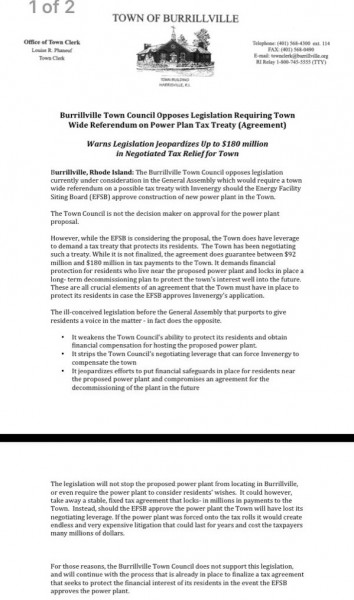
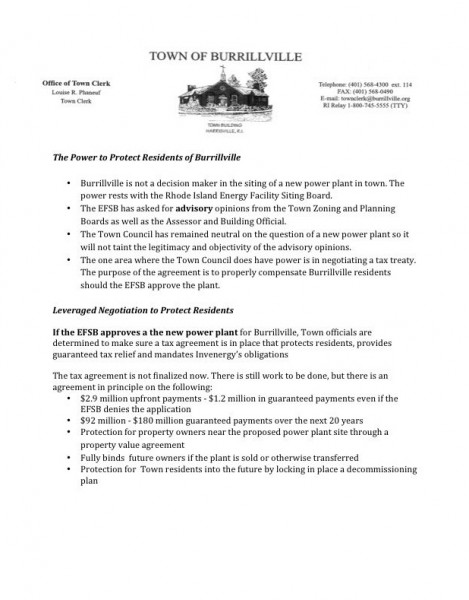
From Jerry Elmer: “Document 2, page 1, bullets at the bottom: Town Council claims it has remained “neutral” on whether the plant should be built in order not to taint its comments to the EFSB. Two things must be said about this. First (and maybe more important), these documents show that the Town Council has not remained neutral, and that the Town Council very much wants to enter into a Tax Treaty with Invenergy. The Town Council is urging defeat of the Keable-Fogarty bill which would give the people of Burrillville the right to vote on such a (possible, future) tax treaty. That is not “remaining neutral.” Second, the Town Council has (very seriously) misunderstood what kind of “neutrality” is required of it by Rhode Island law. The Town Council has consistently refused to discuss the proposed Invenergy plant, even at public meetings, called pursuant to the state’s Open Meetings Act, even with a stenographer present. The Town Council pretends that this is being “neutral,” but this is merely ignoring constituents. And, crucially, this refusal to discuss the Invenergy proposal in open meetings is not required by any Rhode Island statute, law, rule, or regulation, including the state’s Open Records Act.”
From Jerry Elmer: “Document 2, page 1, bullets at the bottom: Town Council says that the purpose of the tax treaty is “to properly compensate Burrillville” if the Invenergy plant is built. However, what constitutes a “proper” level of compensation is a judgment call, about which reasonable people may disagree. The main effect of the Keable-Fogarty Bill would be to return that judgment call to the people of Burrillville.”
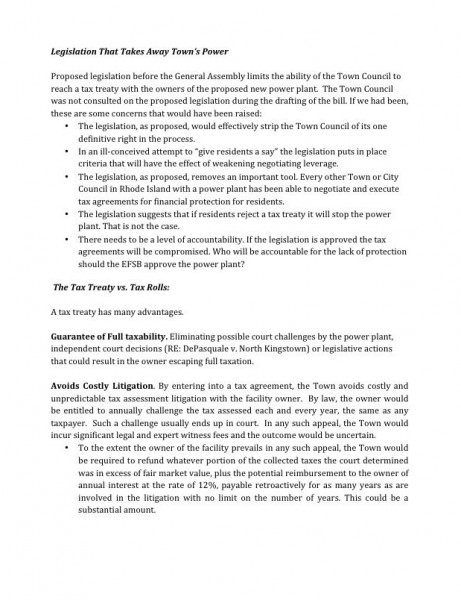
From Jerry Elmer: “Document 2, page 3, bullet half way down page [above], Town Council says: Having a tax treaty is a “guarantee of full taxability” of Invenergy. This is factually incorrect, and it is inconceivable to me that the Town Council is not fully aware of that fact. There is today, in the Town of Burrillville, a background, already-existing tax law that would cover this power plant (just as every municipality in Rhode Island, and indeed the United States, has an existing, background law on how to tax the real estate of individuals and businesses). The only reason that Invenergy wants a tax treaty with the Town of Burrillville is in order to get a different, lower tax rate. This makes sense: Invenergy will not negotiate with the Town for a higher tax rate; no business would do that, because it makes zero business sense. The reason that Invenergy would not negotiate for a higher tax rate is that Invenergy, without any negotiations at all, could get the currently existing tax rate. The only purpose of a tax treaty is to give the applicant (here, Invenergy) a lower tax rate than the existing one. This is true of this tax treaty, just as it has been true of every tax treaty since tax treaties were invented. In other words, when the Town Council says that a tax treaty is meant to be a “guarantee of full taxability” that statement is just factually incorrect.”

From Jerry Elmer: “Document 2, page 2, Town Council says that having a tax treaty in place “eliminates costly appraisals” and “eliminates volatility in future appraisals.” On these two points, the Town Council is speaking the literal truth, but in a deeply misleading way. These statements of the Town Council are factually accurate, but what is left unsaid is that, if the Keable-Fogarty Bill is defeated, that defeat will eliminate the right and ability of the people of Burrillville to vote on a Tax Treaty that may be reached between the Town Council and Invenergy. Let me use an analogy: I am threatening to murder you in cold blood. Before I do it, I tell you to think about the many “advantages” of being dead: you’ll save money on food, you’ll save money on rent, and you’ll never again go to a movie that you end up not liking. What I am saying is literally true, but what I am saying is misleading (in the extreme). So, too, with the Town Council statement. A tax treaty would eliminate costly appraisals — and would eliminate the right of the people of Burrillville to vote on a sweetheart deal reached between the Town Council and the people of Burrillville.”
Tomorrow the Senate takes up their version of the bill, S3037 in Senate Judiciary at 2:30pm in room 313 in the State House. The Burrillville Town Council meets tomorrow evening at 7:00pm in the Town Council Chambers, Town Building, 105 Harrisville Main St., Harrisville.
]]> When the Providence Journal first reported the story about a transgender woman stabbed early Saturday in South Providence, it not only reported her name, it reported her birth name. This is, in the words of Ethan Huckel, board president of TGI Network of RI, “disrespectful and dangerous, because it has the potential to out her as transgender.”
When the Providence Journal first reported the story about a transgender woman stabbed early Saturday in South Providence, it not only reported her name, it reported her birth name. This is, in the words of Ethan Huckel, board president of TGI Network of RI, “disrespectful and dangerous, because it has the potential to out her as transgender.”
Huckel explained, “This is not only a violation of her privacy, but, depending on her personal circumstances, could jeopardize her safety.”
The ProJo corrected this lapse of judgement and the story no longer contains the victim’s birth name, but the click-bait titling of the story, which refers to the woman as a “transgender prostitute” is also problematic.
The ProJo provides no corroboration that the woman was a prostitute. The headline reports that “police say” the woman is a prostitute, but such a claim is both unsubstantiated and irrelevant. As Ethan Huckel again explains, referring to the victim as a prostitute “shifts the focus of the report away from the attack and insinuates that [the victim] is somehow responsible. TGI Network of RI urges the media to use restraint and critical thought when reporting on this assault.”
As a reporter I know how tempting it is to go for the easy, click bait headline, but the victim of this crime deserves our compassion and respect. She should not be reduced to an object, gratifying our salacious curiosity.
As of Tuesday the police were still working to determine if the attack was a hate crime. In deference to the victim’s privacy we have chosen not to link to the original story.
]]> The Providence Journal has done a piece on how their on-line commenters have reacted to their battles with Speaker Nicholas Mattiello and the General Assembly over legislative grants.
The Providence Journal has done a piece on how their on-line commenters have reacted to their battles with Speaker Nicholas Mattiello and the General Assembly over legislative grants.Two highly ineffective and contemptible institutions calling out one another – the RI General Assembly and the Providence Journal.”
 The Rhode Island Supreme Court ruled today that Providence Journal reporter Amanda Milkovits “would not be granted access to public records the Rhode Island State Police made concerning an investigation of an underage drinking incident at property owned by then-Governor Lincoln Chafee that involved the governor’s son, Caleb,” reported Bill Thompson at Channel 12.
The Rhode Island Supreme Court ruled today that Providence Journal reporter Amanda Milkovits “would not be granted access to public records the Rhode Island State Police made concerning an investigation of an underage drinking incident at property owned by then-Governor Lincoln Chafee that involved the governor’s son, Caleb,” reported Bill Thompson at Channel 12.
In response to this ruling, the ACLU of Rhode Island issued the following statement regarding The Providence Journal Company et al. v. The RI Dept. of Public Safety:
]]>The ACLU is very disappointed by the Supreme Court’s ruling in the Caleb Chafee case. We believe it fails to give sufficient weight to the important public interest in monitoring police investigations of high-profile cases.“In denying the Providence Journal access to any of the requested documents, the Court inexplicably points to the large number of records that were withheld as proof that ‘a thorough investigation was performed.’ But without being able to examine the documents, it is impossible to determine a key fact behind the records request — whether the public outcome of the investigation properly reflects what the undisclosed investigation actually uncovered.“For decades, the ACLU has strongly supported both the individual’s right to privacy and the public’s right to know. In this instance, we believe the Court tipped the scales the wrong way. Instead, the decision highlights the need for a stronger open records law in order to allow the public more critical oversight of the state’s law enforcement agencies.”
